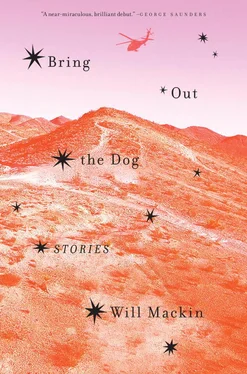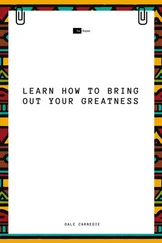Will Mackin - Bring Out the Dog
Здесь есть возможность читать онлайн «Will Mackin - Bring Out the Dog» весь текст электронной книги совершенно бесплатно (целиком полную версию без сокращений). В некоторых случаях можно слушать аудио, скачать через торрент в формате fb2 и присутствует краткое содержание. Город: New York, Год выпуска: 2018, ISBN: 2018, Издательство: Random House Publishing Group, Жанр: prose_military, на английском языке. Описание произведения, (предисловие) а так же отзывы посетителей доступны на портале библиотеки ЛибКат.
- Название:Bring Out the Dog
- Автор:
- Издательство:Random House Publishing Group
- Жанр:
- Год:2018
- Город:New York
- ISBN:978-0-812-99564-0
- Рейтинг книги:5 / 5. Голосов: 1
-
Избранное:Добавить в избранное
- Отзывы:
-
Ваша оценка:
- 100
- 1
- 2
- 3
- 4
- 5
Bring Out the Dog: краткое содержание, описание и аннотация
Предлагаем к чтению аннотацию, описание, краткое содержание или предисловие (зависит от того, что написал сам автор книги «Bring Out the Dog»). Если вы не нашли необходимую информацию о книге — напишите в комментариях, мы постараемся отыскать её.
Bring Out the Dog — читать онлайн бесплатно полную книгу (весь текст) целиком
Ниже представлен текст книги, разбитый по страницам. Система сохранения места последней прочитанной страницы, позволяет с удобством читать онлайн бесплатно книгу «Bring Out the Dog», без необходимости каждый раз заново искать на чём Вы остановились. Поставьте закладку, и сможете в любой момент перейти на страницу, на которой закончили чтение.
Интервал:
Закладка:
“Does it look like I’m ready for the goddamn cake?” Grimes said.
“I’m just asking,” the lieutenant said.
“If I was ready for the fucking cake, do you think I’d be down here and not up there?”
“Sorry, Master Sergeant,” the lieutenant said. “I didn’t know.”
The DFAC’s aluminum frame creaked gently against the wind, as if it were being held down by ropes. As if, absent those ropes, we’d float away to a new and faraway place, where we might live by our own rules.
“Your attention, please!” the lieutenant yelled from the stage. No one paid attention. Then Grimes whistled, and everybody shut up.
“We’re going to postpone the birthday celebration for a few minutes,” the lieutenant announced, “due to a problem that we need to take care of first.”
“That’s me!” Digger shouted, climbing on top of our table. “I’m the problem!”
Soldiers booed and cheered. Digger held his arms open to them while turning a slow circle. Soldiers beat their tables with their fists.
“Fuck you if you’re here to eat cake, and not to fight!” Digger yelled.
There were more cheers than boos this time, as Digger climbed down from the table and returned to his seat.
“See, now, that’s where you and I agree,” Grimes said to Digger. “You think they had birthday cakes in Nam?”
“Exactly,” Digger said.
Grimes’s walkie-talkie squawked. He put the speaker to his ear while looking at the DFAC’s entrance, on the far side of the steam table. Finding no security there, Grimes turned to check the fire exit next to the stage. “I’m in the middle, by the Jell-O cart,” Grimes said into the mike. “Where are you?”
They could’ve been on the ground, surrounded by cut ropes, watching us float away. They could’ve been asking themselves where the hell we thought we were going.
I couldn’t speak for anybody else in the DFAC on rib night. But Digger, it was safe to say, had joined to fight. Hal had joined because if he hadn’t, the war would’ve never been the same. And as for me, I’d joined to see the world.
Baker’s Strong Point
I’d said some things about Reed’s true love the night before. So at breakfast, in the motel lobby, we didn’t talk. We didn’t talk loading the laser equipment into the government truck, either, or pulling out of the parking lot. I suppose if I’d been unsure of the way, Reed would’ve gotten out the map and told me where to go. But the signs through Wendover to I-80 eastbound were easy enough to follow. I cranked up my window in the merge, dropped the truck into fourth. The rising sun turned the windshield gold. I had to take it on faith that the highway unfolded in a long straight line before us.
This was our first trip to Baker’s Strong, a bombing range in the southwest corner of the proving grounds. Dugway OPS had issued us the truck, along with a binder on all the ranges. Reed opened the binder for directions. He looked out the window. Phone poles shushed past, interspersed with gleaming piles of salt. The word INFIDEL was embroidered into the back of his ball cap. Everything in the rearview mirror collapsed on a dot.
Reed broke the silence. “Take this dirt road,” he said.
“Where?” I asked.
“Right here,” he said, pointing.
A dirt road appeared. The sun rolled onto my left shoulder in the turn. We bumped off the easement and climbed up a hill. We descended into a prehistoric lake that had evaporated over millennia. Rings etched in the surrounding high ground marked the waterline’s gradual descent. All that remained was a wide bed of salt.
“Nineteen point seven miles to the OP,” Reed said.
I reset the odometer. Reed closed the binder and pushed in the lighter.
The OP, or observation point, overlooked the southern end of the salt bed, on which a number of targets would be arranged. Standing the laser at the OP, we’d shine it on one of those targets. The laser beam would refract off whatever out-of-service vehicle the target happened to be: half-track, earthmover, tank. Bombs from a B-52, scheduled to be overhead in an hour, would then guide on the refracted energy. Fuses would trigger warheads. Fireballs would bloom like marigolds, turning inside out and black.
The lighter popped.
“Listen, man,” I said. “I’m sorry.”
“For what?” Reed spoke out of the side of his mouth that was not concerned with touching the cigarette to the lighter’s red-hot coil.
“For what I said about Cheyenne last night.”
I’d known Reed for five years by then. In that time, we’d made three deployments to Afghanistan together. While deployed, we’d controlled air strikes in support of night raids. We’d had good nights and bad. Mostly good, early on; then the bad nights had started to accumulate. Toward the end of our second deployment, they’d pulled about even. Midway through our third, bad nights had surpassed good. I didn’t know how future deployments were going to play out, but the trend was worrisome. I couldn’t help but extrapolate that trend five or ten years into the future, when Reed and I would be civilians who, on certain nights, would recall things that had happened during the war. Looking back on those things, I’d probably see good stuff as bad, and bad stuff as worse. Some nights I’d probably want to call Reed and talk about it. Or, maybe, talk about other things as a way of getting around to it. For example, that morning we drove to Baker’s Strong OP—how the dust rose to a certain level in our wake. How the odometer, on every rotation, stuck at eight-tenths of a mile.
Reed filled his lungs with smoke, and held it. His eyes watered. He exhaled a stream, tight as wire, out the cracked-open window. “I’ll admit,” he said, “it’s not an ideal situation.”
“So how’d you leave it with her?” I asked.
“She’s in my room with the gun.”
HALF OF WENDOVER was in Utah, half in Nevada. A bright line painted across Main Street separated the two. The Nevada side had neon casinos, glittering strip clubs, fluorescent knife shows, et cetera. The Utah side had darker versions of the same things.
The Pump House was a cinder-block establishment on the Utah side, between the interstate and the railroad tracks. It was named for what it used to be. The pumps were long gone. Cut boards covered holes in the floor where pipes had risen from the ground. The music, I supposed, was at least as loud as the pumps would’ve been. A woman danced on a plywood stage in chrome heels. Others floated around in velvet capes, their faces turned purple by the black light.
I’d seen these women before, in Afghanistan, in the aftermath of an aerial bombardment. As I’d walked from my covered position toward the hissing point of impact—through bitter walls of smoke and over glowing rings of frag—these women had flown toward me. I didn’t know where they’d come from, but I liked to think that in guiding the bomb to earth I’d released them from captivity. Maybe they’d slipped through the hole the bomb had torn between our world and another, or perhaps they’d waited—burrowed into the dirt like spores—for the bombs to fall. In any case, they had wings and they could fly. I watched them climb, dive, and roll over half-dead men, half-buried in the smoldering earth. I watched them weave through stands of burning trees. As they returned to me, their wings smelled like burnt hair. Their kisses felt cold. In war, I was their savior. At the Pump House, however, I was just another man whose questionable urges lay barely submerged.
Reed sat with me at the bar for a while, drinking beers, until Cheyenne walked by. He shouted at her over the music, “Don’t I know you from somewhere?!”
Читать дальшеИнтервал:
Закладка:
Похожие книги на «Bring Out the Dog»
Представляем Вашему вниманию похожие книги на «Bring Out the Dog» списком для выбора. Мы отобрали схожую по названию и смыслу литературу в надежде предоставить читателям больше вариантов отыскать новые, интересные, ещё непрочитанные произведения.
Обсуждение, отзывы о книге «Bring Out the Dog» и просто собственные мнения читателей. Оставьте ваши комментарии, напишите, что Вы думаете о произведении, его смысле или главных героях. Укажите что конкретно понравилось, а что нет, и почему Вы так считаете.












